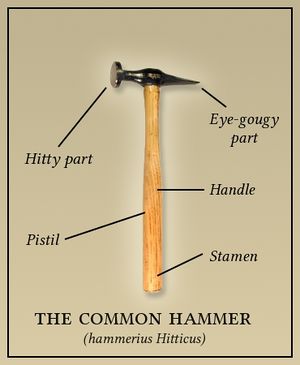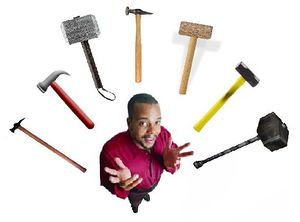Hammer

“When all you have is a hammer, everything else looks like it needs a good solid whack in the head with a hammer.”
A hammer is a tool, consisting of a long wooden handle attached to a shaped chunk of metal, that is capable of solving all problems. The chunk of metal is specially designed to perform the hammer's most important functions:
The hammer is exceedingly good at its job.
Usage
Any old shmuck can swing a hammer around, but only a true hammer enthusiast will do it right. Passing down the ancestral knowledge of the hammer is difficult, but not impossible; such is becoming an expert at anything, but the hammer requires all you've got to give, physically and spiritually. Keep that in mind as you continue reading.
A hammer is best wielded with a firm two-hand grip, dominant hand on top. Of course, if you feel the urge to hook the eye gouging part around two fingers and swing it wildly in all directions, with the hammer held tenuously in your hand by the power of centripetal force alone, feel free. No one will stop you. Indeed, everyone will be too afraid to stop you.
The proper way to handle a hammer varies depending on how the user wishes to operate it. Here is a simple guide:
Hitting
Swing the hammer high above your head, scream maniacally, then forcefully slam the blunt end of the hammer down upon your intended target with every fiber of your being. Hernias are a possibility for heavier Norse hammers.
For maximum damage, strike the target squarely on top of the head. Squeamish users may want to steel themselves for the resulting spray of blood and gray matter. The well-trained will often try the Norse God approach and throw the hammer viciously at the opponent. Though effective and fun to watch, it is very difficult for even the veteran hammers user to have the hammer come back to them.
Eye gouging
Direct the sharp "prongs" of the hammer into either of the target's eye sockets. Careful aim is needed in order to successfully gouge out an eye, rather than cause a simple puncture wound or compound fracture. The optimal point of entry for the hammer is just between the target's eye and eyebrow – aiming down, of course. Ambitious practitioners can try for the more challenging "underhand" eye-gouge maneuver, in which the hammer is swung down behind the user and then back up, under the target's eye.
Do not be disappointed if the eye fails to exit its socket on your first try. The purpose of the attack is to blind and maim the subject; freeing the eye itself is merely a flourish of sorts. Another unrealistic expectation is hoping to see the eyeball burst. This rarely occurs, since the eyeball is very tough in construction.
“But a man can dream, can’t he?”
– Oscar Wilde on bursting someone's eye with a hammer
Ha ha ha! Yes indeed, Mr. Wilde. A man can dream.
Hammer dos and don'ts
Some tips to keep in mind while using a hammer.
DO:
|
DON'T:
|
Abusing the hammer
There are those who would abuse the noble, maiming power of the hammer for more mundane ends, e.g. home repair or basic construction. Why someone would want to waste the power of such a beautifully destructive weapon on something so banal is difficult to understand, but it persists nonetheless. Hammer connoisseurs, however, may take pleasure in the knowledge that those who misuse the hammer often hit their thumbs when trying to pound in a nail. For those who've never experienced this type of accident, it really, really, really hurts. A lot.
The life-cycle of a hammer
Contrary to popular belief, hammers are living things that deserve our love and respect, quite unlike those destined to receive its awesome destructive power.
The hammer's scientific name is Hammerius hitticus, which is obviously a bland and misguided attempt to write something hammer-related in a vaguely Latinate manner.
Hammers are the end result of the combination of many diverse genetic materials, mainly that of trees and metallic deposits. The mating cycle begins when two people get into a hammer fight. During the vicious ritual, the genetic material contained in the hammers' pistils and stamen (see illustration) are mixed together and then fall to the soil. These bits of DNA combine with the blood of the victims to form the seeds of new trees and veins of metal deep underground.
Once the trees and metals have formed, they are harvested by human workers. The genetic information is then spliced together in the glorious love shack that is a hammer factory. The end product is then shipped out to bloodthirsty, hammer-fighting maniacs around the world. Thus the Bloody Circle of Life is begun anew.
Breeds of hammer
Hammers have been selectively bred for a variety of military applications. It would be unwise to attempt a conclusive list of hammers. However, a few notable varieties are worth mentioning.
- Warhammer The warhammer is the ultimate hammering machine. Most war hammers are specially bred to have more metal ores in them. The hitty part and the eye gougy part are usually much larger. Also, metal ores often run down the length of the handle, and may extend all the way to the pistil or stamen. This makes for a much sturdier handle, which can better withstand the rigors of war.
- Ball-peen hammer The ball-peen hammer is a peculiar hammer, having two hitty parts and no eye gougy part. One hitty part is rounded, and is called the "ball". The other hitty part is flat, and is called the "peen". Some suggest that the ball-peen hammer is the only hammer in which the male reproductive organs are fully developed.
- Claw hammer The Claw hammer is the traditional hammer, where the eye gougy part is divided into two sections. It is understood that this bifurcation enhances the chance of actually removing the eye. "Carpenters" claim that this bifurcated eye gougy part is for pulling nails. Tests on how nails can be pulled with the eye gougy part have produced some inconsistent results, although they can definitely mangle hands pretty good.
- Brick hammer The brick hammer is constructed with the eye gougy part un-bifurcated, and slightly less curled. Brick hammer eye gougy parts are notably better at popping eyes than gouging them. Also, brick hammer eye gougy parts tend to be rather effective at trepanning the enemy, in the event that the user misses the eye. Some brick hammers have ore material extending down the handle for better reinforcement. The brick hammer is also useful for finger removal, such as in twenty questions.
- Rock hammer Rock hammers are made with a peculiar handle composed of metal ore and rubber instead of wood. Their eye gougy part is also designed with an un-bifurcated tip, but this one comes to a single pick like point. It has been suggested that this pick point actually is ideal for blinding the opponent.
- Sledge hammer This hammer is bred with two over-sized hitty parts, and an extra long handle. While the lack of an eye gougy part seems to make removing eyes impossible this is not the case. The extra size of the hitty parts makes it possible to remove both eyes at the same time if you hit your opponent hard enough on the back of the head.
- Drywall hammer/Roofing hammer Abstract features involving texture on the hitty part define these two classes of hammer in ways which only an expert can explain. However, both breeds of hammer have an axe-like head on the back side of the hammer, instead of an eye gougy part. It is suggested that these are actually the result of hammer-axe cross breeding.
- Mallet The mallet appears to be a hammer made without metal ores. The two hitty parts on top of the handle are often made of wood, plastic, or leather. Since they are usually not powerful enough to draw blood, there is some confusion as to how these weak hammer-like creatures breed at all.
Conclusion
The world of hammers is a rich and exciting place for the ultra-violent to explore. There are:
- Traditional hammers
- Hammerhead sharks
- Bananahammers
- Jumbo novelty hammers
- Meat tenderizers
- Radios
- Squeaky-toys
There is also a nearly infinite variety of hammer types, styles, attacks, and criminal statutes to immerse yourself in. And it is so easy to take part. Simply pick up a hammer and pound anything that moves (or that doesn't move, for that matter. You can kill a building with a strong enough swing.) It's fun, educational, and a great way to test the limits of the self-defense clause. Happy hammering!
- NOTE: This article is in no way related to MC Hammer.



